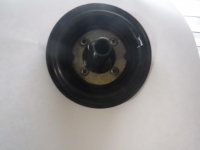Bad things come in 3's. I hit the Trifecta today. Wanted to mow the lawn - grass got high, but had to move the Triumph.
1. TR6 battery was very weak and died. 6 years old.
2. Lawn tractor battery went dead. 3 years old.
3. Got the TR started with charger attached and drove down to AutoZone. Almost there it happened. Car started missing and wouldn't rev over 2500 rpm or so. I limped to AZ, had the guy install the battery, purchased a tractor battery (they had one) and headed for home. The car stalled at every light, would not idle, would not rev without cutting out and I wondered if this would be the first time in over 20 years that it would leave me stranded. To top it off, I left my cellphone at home. Somehow, it didn't fail me and I made it home just before the rain. What could it be? I first checked the points and they were almost closed so I adjusted them to .015 - no difference. I changed the coil - I carry 2 spares - no difference. I checked the dashpot oil. Down a bit, so I refilled - no difference. Than the rains came. I moved the Subaru out and the TR in. Before I start in again, am I missing something obvious? The condenser is fairly new so I didn't swap it out yet. Fuel pump? Doubtful. They either work or they don't in my experience.
1. TR6 battery was very weak and died. 6 years old.
2. Lawn tractor battery went dead. 3 years old.
3. Got the TR started with charger attached and drove down to AutoZone. Almost there it happened. Car started missing and wouldn't rev over 2500 rpm or so. I limped to AZ, had the guy install the battery, purchased a tractor battery (they had one) and headed for home. The car stalled at every light, would not idle, would not rev without cutting out and I wondered if this would be the first time in over 20 years that it would leave me stranded. To top it off, I left my cellphone at home. Somehow, it didn't fail me and I made it home just before the rain. What could it be? I first checked the points and they were almost closed so I adjusted them to .015 - no difference. I changed the coil - I carry 2 spares - no difference. I checked the dashpot oil. Down a bit, so I refilled - no difference. Than the rains came. I moved the Subaru out and the TR in. Before I start in again, am I missing something obvious? The condenser is fairly new so I didn't swap it out yet. Fuel pump? Doubtful. They either work or they don't in my experience.

 Hi Guest!
Hi Guest!

 smilie in place of the real @
smilie in place of the real @
 Pretty Please - add it to our Events forum(s) and add to the calendar! >>
Pretty Please - add it to our Events forum(s) and add to the calendar! >> 


